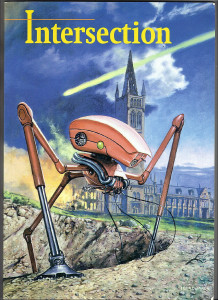(This essay has been published on the official Souvenir Book of Intersection, the 53rd World Science Fiction Convention (Worldcon) which was held in Glasgow, Scotland in 1995)
 In almost all the science fiction books I’ve read what has always surprised me is the presumed absence of science fiction itself from humanity’s future. The past and present science fiction writers have written a multitude of stories which take place in thousands of futures basically different from our present. However, oddly, in none of these futures exists what actually gives rise to them, that is science fiction. Of course there are a few exceptions. Now and then there will be the shy showing up of a science fiction writer as a character, but this is quite unusual. All the same, such a character is generally no more than an elementary projection of the author himself, a sort of self-quotation, something close to Hitchkock’s walk-on parts in his own movies. More often the future described by science fiction writers does not take into consideration SF. Why? Why do science fiction writers seem to constantly forget to include SF literature in the futures they tell us about? Do they avoid talking about it because they think that in the future SF literature won’t be much different than today? Do they really commit such an ingenuous mistake? Or don’t they know what to say about it? Or didn’t it ever come to them that it is reasonable to think that SF will exist in the future? All these writers are willing and glad to talk about the past of science fiction and are telling us all the time about it’s history. Why is there all this attention and care for the past, and almost none for the future? When SF writers talk about SF, why do they always use the past tense instead of the future? Continue reading
In almost all the science fiction books I’ve read what has always surprised me is the presumed absence of science fiction itself from humanity’s future. The past and present science fiction writers have written a multitude of stories which take place in thousands of futures basically different from our present. However, oddly, in none of these futures exists what actually gives rise to them, that is science fiction. Of course there are a few exceptions. Now and then there will be the shy showing up of a science fiction writer as a character, but this is quite unusual. All the same, such a character is generally no more than an elementary projection of the author himself, a sort of self-quotation, something close to Hitchkock’s walk-on parts in his own movies. More often the future described by science fiction writers does not take into consideration SF. Why? Why do science fiction writers seem to constantly forget to include SF literature in the futures they tell us about? Do they avoid talking about it because they think that in the future SF literature won’t be much different than today? Do they really commit such an ingenuous mistake? Or don’t they know what to say about it? Or didn’t it ever come to them that it is reasonable to think that SF will exist in the future? All these writers are willing and glad to talk about the past of science fiction and are telling us all the time about it’s history. Why is there all this attention and care for the past, and almost none for the future? When SF writers talk about SF, why do they always use the past tense instead of the future? Continue reading